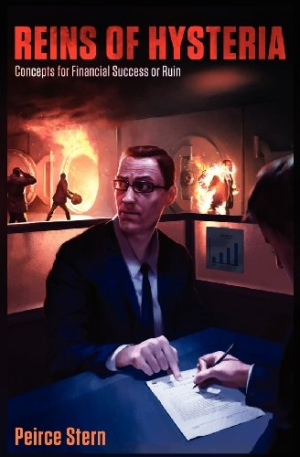Reins of Hysteria
Concepts for Financial Success of Ruin
In the aftermath of the financial crisis, many books have attempted to explain exactly what went wrong. There has also been a steady stream of guides on pre- and post-crisis investment and general finance issues. Peirce Stern’s Reins of Hysteria: Concepts for Financial Success or Ruin keeps one foot in each of these territories while marking a unique niche for itself as a self-described “nonfictional dark comedy.”
The title is perhaps not the best indicator of what lurks inside the book’s pages. Stern begins with an immensely entertaining section summarizing “the whole of human history, condensed into the best parts, presented for the first time in a mere 37 pages.” This is followed by another section on the history of fiat capital in America, which amuses as it exposes the gradual untethering of currency to real assets (gold). It is well past the halfway point of the book before Stern gets into the nitty-gritty of banking and modern-day financial systems, but once he does, he educates the reader in the same breezy but informative style exhibited in the historical segments.
Stern has a background in comedic writing as well as in business, and he combines both to keep the subject—the global financial system—enjoyable, and to uncover its inner workings. Thus, the distinctive feature of Reins of Hysteria is that it is extremely readable, despite the often complex subject matter. When an overload of information threatens to cloud his message, Stern pulls back on the throttle and uses humor to keep the reader engaged. For example, he warns of the dangers of complex options, mentioning stochastic calculus and the options pricing algorithm, then follows with a lighthearted segue to the next chapter: “And anyhow, if you wanted to risk losing all of your money, swaps are really the best way to go.”
For all its benefits, the book comes up short in the advice department, as Stern’s proactive recommendations consist of just a few paragraphs. Aside from earnest advice to invest in career skills, education, and training, Stern merely says to “invest in a diversified portfolio of stocks,” with no actual mention of the best way to do that. Exchange traded funds or individual stocks? Actively managed mutual funds or index funds? Maybe all of that has been left for Stern’s next book.
There are a few mistakes throughout the text that more careful editing would have caught: “history generally moves foreword in progress,” “I shutter to think,” and “members spanning the gambit of an organization.” These prove distracting, but not fatally so.
With its excellent overview of the financial markets and their history, Reins of Hysteria offers real value to most readers. Those seeking detailed advice on how to get rich will be disappointed, but readers who aren’t looking for the next Suze Orman will find themselves quite entertained.
Reviewed by
Peter Dabbene
Disclosure: This article is not an endorsement, but a review. The publisher of this book provided free copies of the book and paid a small fee to have their book reviewed by a professional reviewer. Foreword Reviews and Clarion Reviews make no guarantee that the publisher will receive a positive review. Foreword Magazine, Inc. is disclosing this in accordance with the Federal Trade Commission’s 16 CFR, Part 255.

